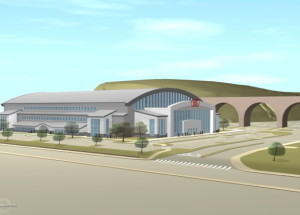Report concludes that substantial private investment needed to make it work

A rendering shows the proposed velodrome that former Olympic cyclist David Chauner hopes will occupy the area known as “the flats” in downtown Coatesville.
The circumstances necessary for a successful velodrome project in Coatesville are much clearer with the completion of a market feasibility study that shows a city velodrome/events center can work, but only under a relatively narrow set of conditions, said a Chester County Economic Development Council news release.
The idea of a velodrome in Coatesville that doubles as an events center has captured significant attention over the past few years, with the hope that the project would establish the city as the center for biking for the Philadelphia region and beyond.
“The potential of bringing large numbers of visitors who could support the velodrome and help to revitalize Coatesville’s economy has significant appeal,” said Joseph DiSciullo, chairman of the Coatesville Redevelopment Authority Board of Directors. “However, a lack of understanding of the realities of both the market for a velodrome and the economics of such a facility has hampered efforts to get the project off the ground. To address that problem, we commissioned this study, with financial assistance from the Chester County Conference and Visitors Bureau.”
The feasibility study was conducted by Convention, Sports and Leisure (CSL), a nationally recognized company expert in assessing the prospects for stadiums, arenas and public event centers. CSL examined the operational characteristics of velodromes all over the world, completed a substantial survey of the regional biking community to assess biker interest, and developed estimates for attendance at biking and non-biking events at a Coatesville velodrome. The company also analyzed the potential for retail space as part of the facility.
According to the CSL study, a velodrome, with additional non-biking events and retail space revenue, would be able to generate sufficient revenue to cover annual operating expenses within five years of construction. However, the CSL study also revealed that a velodrome, with the additional non-biking events and retail space revenue, would likely not be able to generate sufficient revenue to pay any level of debt service, real estate taxes, or establish a capital reserve. Without debt financing, 100 percent of the estimated $27 million cost of construction would need to be provided from some combination of developer equity and public funding, the release said.
Chester County Commissioners’ Chairman Ryan Costello, speaking on behalf of the board, indicated that this information is critical to making an informed decision on county support for the velodrome project. “The (flats) site is extremely critical to the continued revitalization of Coatesville. Even more important than any particular specific use is the need for the site to create jobs, revenue, and a use that attracts more visitors to the downtown,” he said.
“We as a board of commissioners felt it important to help fund the study in order to assist the RDA as they move forward with determining the best way to attract interest in the site,” said Costello. “The velodrome is an exciting idea, though this report makes it clear that substantial private investment would be required in order to make it happen.”
DiSciullo had a similar response regarding the study results. “Historically, we anticipated that a significant portion of the project would be bank-financed,” he said. “Without the possibility of such debt financing, the prospects for the project are much more challenging. “I thank the county and the Conference and Visitors Bureau for helping to fund the study, and the Chester County Economic Development Council for their assistance in managing the study process.”
David Collins, president of Coatesville City Council, said he had supported the project as a way to “bring new life to the downtown area of Coatesville. However, the ability of the project to contribute to the tax base is crucial to the City’s revitalization plans … if the project is to move forward, any inability to generate tax revenue will certainly require a careful analysis of the extent of the compensating benefits to the city.”
David Chauner, the principal proponent of the velodrome/events center project, welcomed the results of the CSL study. “While the eastern U.S. desperately needs a year-round cycling facility, it’s good to have confirmation that a velodrome in Coatesville can work on an operational basis,” he said. “Equity financing from sports-minded investors who see this unique opportunity is now more likely.”
Mr. DiSciullo indicated that the Redevelopment Authority will continue to work with Chauner’s group in the hopes that they can raise the necessary equity. He noted, however, that given the challenges of finding millions of dollars in private equity, the authority will also be looking at alternative uses for the “Flats” property in the event that the necessary equity cannot be identified.
The CSL Velodrome study can be found online on the Coatesville Redevelopment Authority website –www.coatesville.org/redevelopment-authority, and also on the Chester County Conference and Visitors Bureau website, www.brandywinevalley.com, and the Chester County Economic Development Council website, www.cceconomicdevelopment.com/wp/wp-content/uploads/CSL-Coatesville-Final-Report.pdf.






